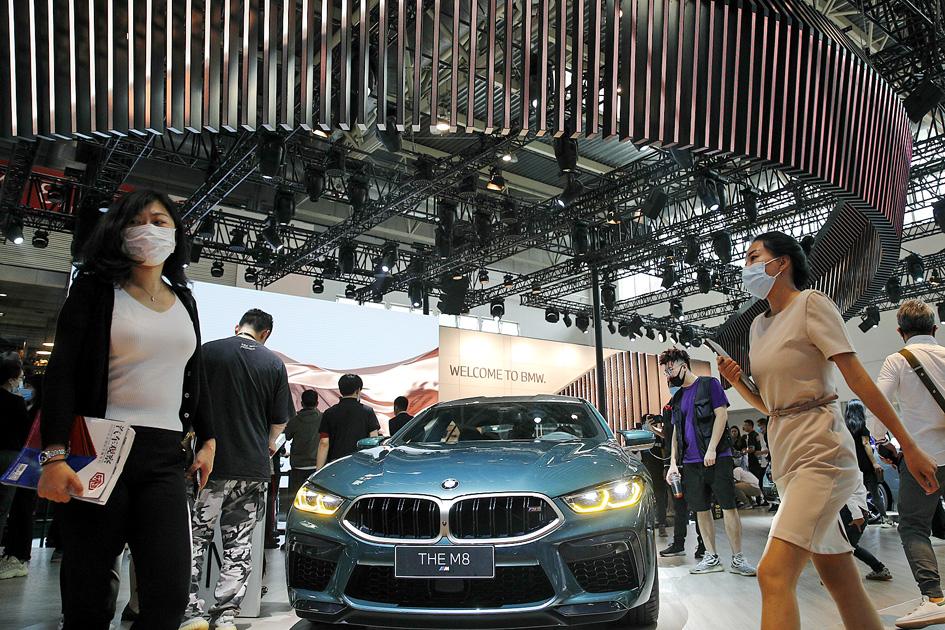Answering to a reported request by Germany to help address a chip shortage in its auto industry, the Ministry of Economic Affairs (MOEA) yesterday said that it was in talks with domestic chip suppliers.
Foreign media over the weekend reported that German Minister of Economic Affairs Peter Altmaier had sent a request to Taipei to ask Taiwan Semiconductor Manufacturing Co (TSMC, 台積電) to cooperate more closely with German automakers to provide microchips and sensors, to bridge a shortage that has emerged over the past few months.
The MOEA said that it had not yet received the request and could therefore not elaborate on the matter.

Photo: AP
However, it has received requests from several other countries for help solving supply shortages of automotive chips, the MOEA said.
Most major international automakers have no direct business dealings with TSMC, as they rely on international suppliers, which purchase chips from TSMC and other Taiwanese firms, it said.
The auto chip shortages can be attributed to leading automotive chip suppliers reducing their inventories during the low season, the MOEA said.
It has asked Taiwanese chipmakers to work toward solving the supply crisis in other countries, the MOEA said, adding that domestic firms have responded to the request and are in talks to address the shortages.
TSMC would work closely with its auto electronics customers to help meet their chip demand, the Hsinchu-based firm told the Central News Agency yesterday.

Three experts in the high technology industry have said that US President Donald Trump’s pledge to impose higher tariffs on Taiwanese semiconductors is part of an effort to force Taiwan Semiconductor Manufacturing Co (TSMC, 台積電) to the negotiating table. In a speech to Republicans on Jan. 27, Trump said he intends to impose tariffs on Taiwan to bring chip production to the US. “The incentive is going to be they’re not going to want to pay a 25, 50 or even a 100 percent tax,” he said. Darson Chiu (邱達生), an economics professor at Taichung-based Tunghai University and director-general of

‘LEGACY CHIPS’: Chinese companies have dramatically increased mature chip production capacity, but the West’s drive for secure supply chains offers a lifeline for Taiwan When Powerchip Technology Corp (力晶科技) entered a deal with the eastern Chinese city of Hefei in 2015 to set up a new chip foundry, it hoped the move would help provide better access to the promising Chinese market. However, nine years later, that Chinese foundry, Nexchip Semiconductor Corp (合晶集成), has become one of its biggest rivals in the legacy chip space, leveraging steep discounts after Beijing’s localization call forced Powerchip to give up the once-lucrative business making integrated circuits for Chinese flat panels. Nexchip is among Chinese foundries quickly winning market share in the crucial US$56.3 billion industry of so-called legacy

Hon Hai Precision Industry Co (鴻海精密) is reportedly making another pass at Nissan Motor Co, as the Japanese automaker's tie-up with Honda Motor Co falls apart. Nissan shares rose as much as 6 percent after Taiwan’s Central News Agency reported that Hon Hai chairman Young Liu (劉揚偉) instructed former Nissan executive Jun Seki to connect with French carmaker Renault SA, which holds about 36 percent of Nissan’s stock. Hon Hai, the Taiwanese iPhone-maker also known as Foxconn Technology Group (富士康科技集團), was exploring an investment or buyout of Nissan last year, but backed off in December after the Japanese carmaker penned a deal

WASHINGTON POLICY: Tariffs of 10 percent or more and other new costs are tipped to hit shipments of small parcels, cutting export growth by 1.3 percentage points The decision by US President Donald Trump to ban Chinese companies from using a US tariff loophole would hit tens of billions of dollars of trade and reduce China’s economic growth this year, according to new estimates by economists at Nomura Holdings Inc. According to Nomura’s estimates, last year companies such as Shein (希音) and PDD Holdings Inc’s (拼多多控股) Temu shipped US$46 billion of small parcels to the US to take advantage of the rule that allows items with a declared value under US$800 to enter the US tariff-free. Tariffs of 10 percent or more and other new costs would slash such